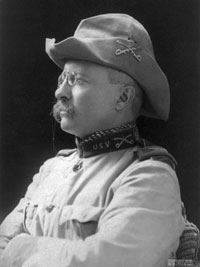The Wolf Hunt
Teddy Roosevelt’s fame as a commander in the Spanish-American war, of course, catapulted his political popularity and was soon elected as the governor of New York, then tapped as vice president, and upon the assassination of William McKinley, became president of the United States.

While most of the hunt took place just across the Red River in Oklahoma, towards the hunt’s end, the party relocated to a ranch south of Quanah near the present-day Lake Pauline. Just south of town, a county road [Wolf Hunt Road] pays homage to the event.
In his memoir titled, Outdoor Pastimes of an American Hunter, Roosevelt describes a lively hunt in which, “...we entered the town after dark, some twenty of us on horseback... We broke into a lope a mile outside the limits, and by the time we struck the main street, the horses were on a run and we tore down like a whirlwind until we reached the train. Thus ended as pleasant a hunting trip as anyone could imagine.”
In all, the group took seventeen coyotes on the hunt. Roosevelt was fascinated by one of the hunters, Jack Abernathy, and was impressed by his ability to catch and tie up live coyotes by hand. President Roosevelt, in complimentary fashion, was reported to have quipped to Abernathy, “...I want you to be my guest in Washington, and every time you see a senator grab him and tie up his jaws the way you do those wolves.”
Lasting Texas Legacies
While parks and streets in San Antonio bear Roosevelt’s name, one Texas community was named in honor him. . Established in 1898 out on the hardscrabble edge of the western Texas Hill Country in Kimble County, Roosevelt, Texas was named for the future president after it was reported he visited the area with the Rough Riders before heading to the Spanish-American War.
Perhaps the long lasting influence that Teddy Roosevelt had on Texas was his strong conservation ethic and his leadership in bringing conservationist principles to the forefront after the excesses of market hunting decimated wildlife populations in the 19th century.
Founded in 1887 by Roosevelt and a handful of other like-mined individuals, the Boone & Crockett Club was formed to promote fair-chase in hunting and lobby for conservation minded hunting regulations. Additionally, the Boone & Crockett Club established standards by which big game animals are judged. The Boone & Crockett scoring system is the most widely used system for objectively establishing a measurable score for antlered and horned mammals.
Interest in big deer has shaped the way most Texas hunters think and a huge deer hunting culture has emerged. Today, Texas is recognized internationally as being one of the top states for harvesting free range whitetail deer with the potential of making the Boone & Crockett Club record books.
In 1903, President Roosevelt paved the way to set aside lands for the protection of wildlife when he authorized the creation of the first National Bird Preserve on Pelican Island, Florida. The move eventually paved the way for the national wildlife refuge system and today, Texas is home to fifteen National Wildlife Refuges encompassing more than 400,000 acres.
While Roosevelt was a New Yorker by birth, his impact on Texas culture and folklore is undeniable. As a soldier, conservationist, hunter, and president, he held Texas and Texans in high esteem and his impact on our state lasted well beyond his passing.